While 85% of business leaders recognize the positive impact of implementing GRC software to enforce compliance and risk standards and enhance internal auditing 1 . Yet, organizations struggle to choose the appropriate solution since the market landscape is complex with more than 150 GRC platforms and various intersecting categories.
Given the intricate array of tools, organizations should pinpoint the appropriate GRC software for their needs by:
- Narrowing down market-leading GRC solutions.
- Defining the specific type of GRC functionality their business needs.
This article aims to facilitate your review process by presenting a list of prominent GRC software leaders and categorizing them based on seven types of GRC.
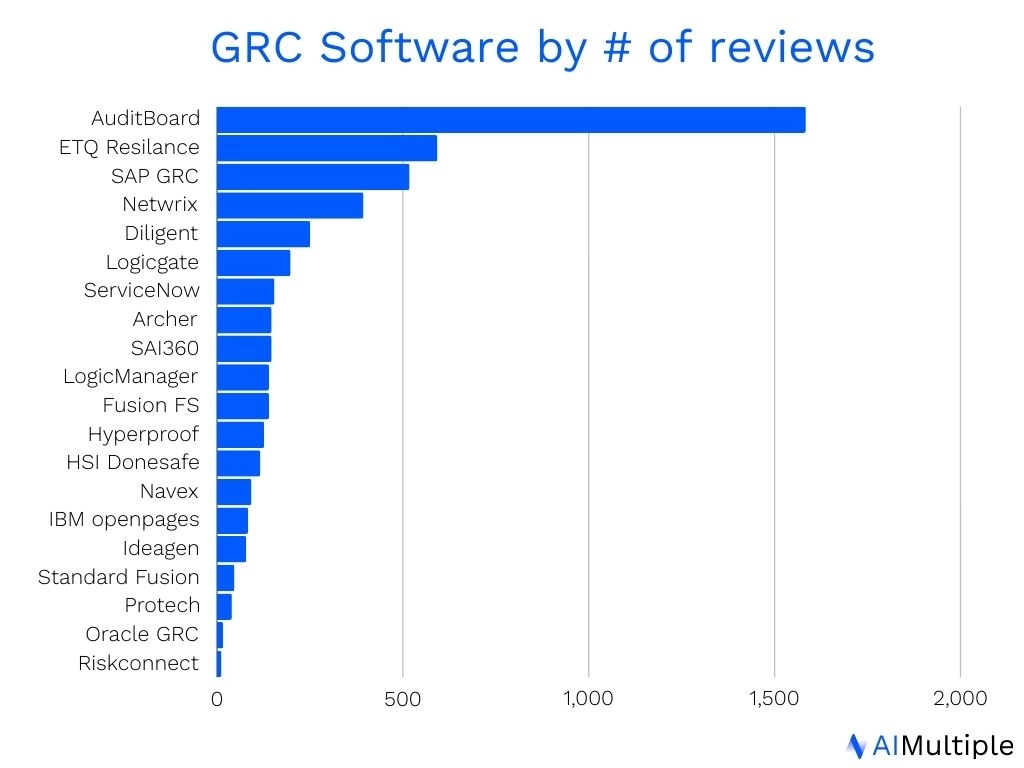
Selection criteria for GRC software
Enterprises should evaluate various GRC software providers to find the best solution for their needs. However, the large number of options in the market makes this assessment process more complex.
As a result, we narrowed down potential vendors based on three criteria:
- The number of employees on LinkedIn: We focused on vendors with more than 50 employees listed on LinkedIn, as smaller vendors may lack the capacity to serve larger enterprises effectively.
- Comprehensive platforms: We’ll focus on the most complete solutions, including tools from big tech companies, GRC suite providers, and those with an enterprise risk management program, even though there are many tools available.
- Number of reviews: We omit vendors that lack reviews on any B2B review platforms, as the absence of feedback might indicate a limited adoption rate. Table below shows the review numbers for each vendor:
Shortlisted GRC tools comparison
GRC tools that satisfy the criteria specified above are:
1.) AuditBoard
AuditBoard, a GRC platform, streamlines compliance processes, facilitating integrated risk management. It empowers organizations to manage and assess risks through efficient internal audit workflows.
Pros & Cons:
In AuditBoard customer reviews we gathered, pros and cons are listed:
Pros:
- Ease of use: The most positive word in all the reviews is “Easy to use” with 15%.
Cons:
- High pricing plan: AuditBoard’s negative reviews raise concern over its expensive price by 1%.
2.) SAP GRC
Description: SAP GRC, a suite by SAP, enables organizations to manage risks and compliance with integrated risk management modules. It facilitates efficient access control, process control, and compliance tracking.
Pros & Cons:
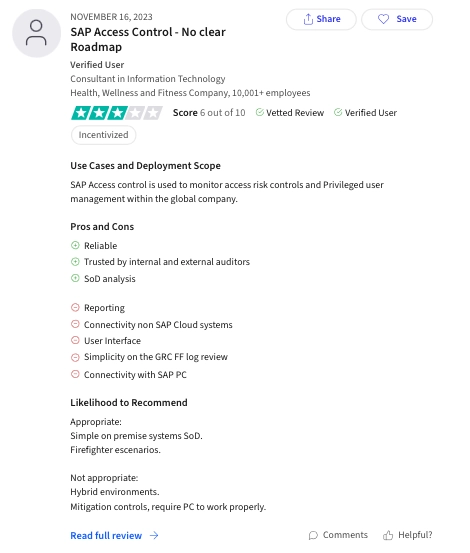
Some SAP Access control’s pros and cons:
Pros:
- SoD analysis: 8 reviews out of 15 speaks positively of segregation of duties analysis, which assesses and ensures that individuals or roles within an organization do not have conflicting responsibilities that could potentially lead to fraudulent activities or errors (See Figure 2).
Cons:
- Vendor lock-in: SAP has limited integration opportunities with non SAP systems (See Figure 2).
3.) Logicgate
Logicgate, a GRC platform, focuses on integrated risk management and process automation. It empowers organizations to create custom workflows and automate risk assessments for streamlined compliance processes.
Pros & Cons:
According to customer data on Logicgate, pros and cons are as listed:
Pros:
- Customer service: Logicgate’s strength is identified as its customer service which obtains 9.8 out of 10 in all review sources we gathered.
Cons:
- Steep learning curve: The most negative comment in all customer data was about the difficulty of learning the tool.
4.) ServiceNow
ServiceNow, an enterprise platform, includes GRC capabilities for streamlined compliance processes and integrated risk management. It automates workflows related to governance, risk management, and compliance.
Pros & Cons:
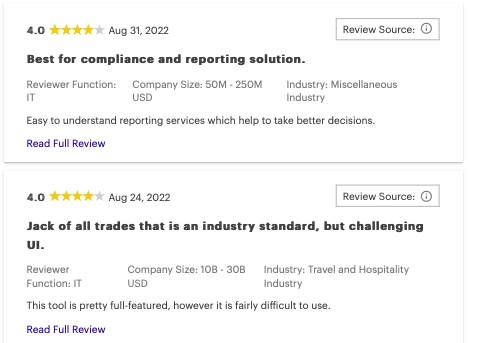
Pros:
- Reporting services: 11 out of 66 reviews on Gartner mention ease of use and benefits reporting services deliver (See Figure 3).
Cons:
- Ease of use: Some users could not find it easy to navigate the entire tool (See Figure 3).
5.) Archer
Archer, now part of RSA, is a GRC platform offering integrated risk management solutions. It provides a centralized platform for organizations to manage and report on compliance processes and various aspects of GRC.
Pros & Cons:
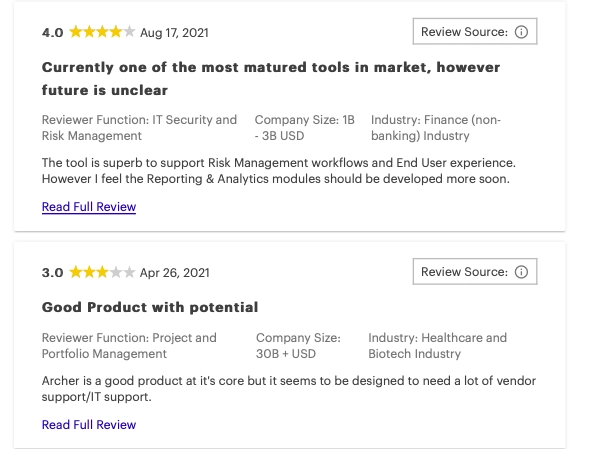
Pros:
- End user experience: Overall end user experience for the tool is high (See Figure 4).
Cons:
- IT support: 6 out of 64 verified reviews reports issues regarding vendor and IT support (See Figure 4).
6.) Hyperproof
Hyperproof, a compliance operations platform, simplifies compliance management processes. It aids organizations in managing and demonstrating adherence to industry standards through integrated risk management.
Pros & Cons:
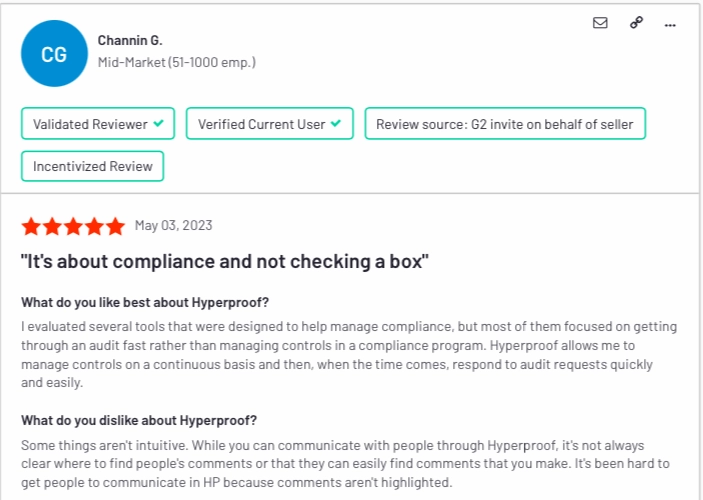
Pros:
- Fast auditing feature: Hyperproof users are satisfied with several capabilities, such as fast and easy auditing (See Figure 5).
Cons:
- Lack of Comment Visibility:
- Comment visibility appears to be an issue, making it challenging for users to easily find or highlight comments within the platform. This limitation hinders seamless communication and collaboration among users.(See Figure 5).
7.) Navex
Navex provides a comprehensive suite for ethics and compliance, including document management and integrated risk management tools. It supports organizations in creating a culture of integrity through streamlined compliance
Pros & Cons:
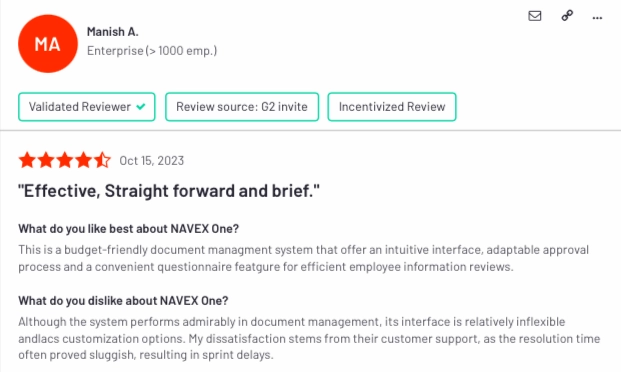
Pros:
- Document Management: NAVEX One is commended for being a cost-effective document management system. Although overall users complain about its high pricing, the most recent comment mentions its provides organizations with an affordable solution for efficient document handling, contributing to overall budget management.(See Figure 6).
Cons:
- Inflexible Interface: Users note that the interface of NAVEX One lacks flexibility and customization options. The system may not cater to diverse user preferences, limiting adaptability for various organizational needs.(See Figure 6).
8.) IBM Openpages
IBM OpenPages, an integrated GRC platform, helps organizations manage risks and compliance. It offers modules for risk management, document management, and internal control for seamless integrated risk management.
Pros & Cons:
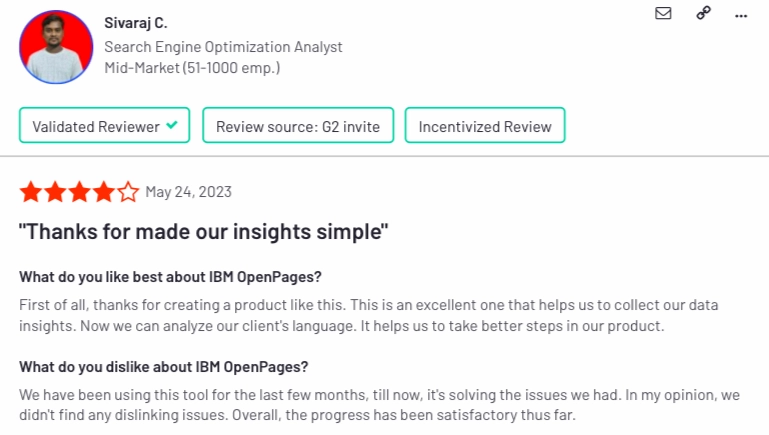
Pros:
- Effective Natural Language Processing (NLP): IBM OpenPages users evaluated NLC for its accuracy and precision in analyzing text data, effectively identifying patterns and relations in large datasets. (See Figure 7).
Cons:
- High pricing: Users express dissatisfaction with the pricing, especially finding it to be high for small businesses or individuals. While they acknowledge that the cost depends on factors such as data volume and support requirements, some users perceive it as prohibitively expensive.(See Figure 7).
9.) Ideagen
Ideagen, a GRC software provider, offers solutions for risk management, audit, and compliance. Its software streamlines compliance processes and aids organizations in adhering to regulations and standards through integrated risk management.
Pros & Cons:
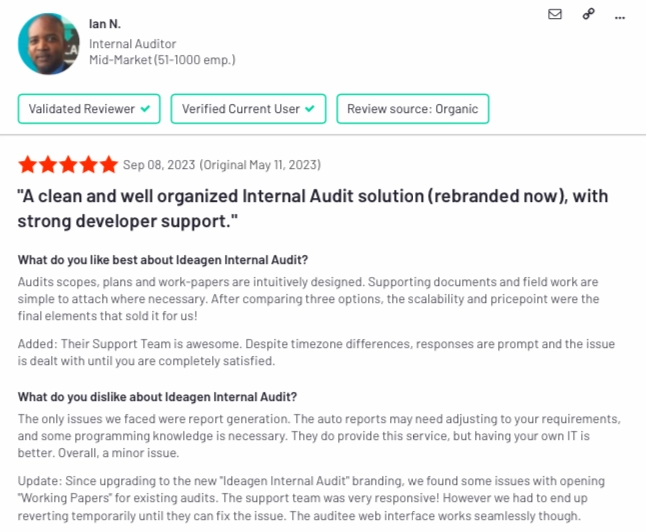
Pros:
- User-Friendly document attachment: The system is commended for its ease in attaching supporting documents and fieldwork where necessary, streamlining audit management (See Figure 8).
- Scalability and pricepoint: Ideagen Internal Audit stands out for its scalability and favorable price point (See Figure 8).
Cons:
- Report Generation Challenges: Users faced challenges with report generation, noting that auto reports may require adjustments to meet specific requirements, and some programming knowledge may be necessary. (See Figure 8).
10.) Oracle GRC
Oracle GRC, a suite of applications, enables organizations to manage risks and compliance. It includes modules for risk management, access control, and policy management within the Oracle ecosystem, supporting integrated risk management.
Pros & Cons:
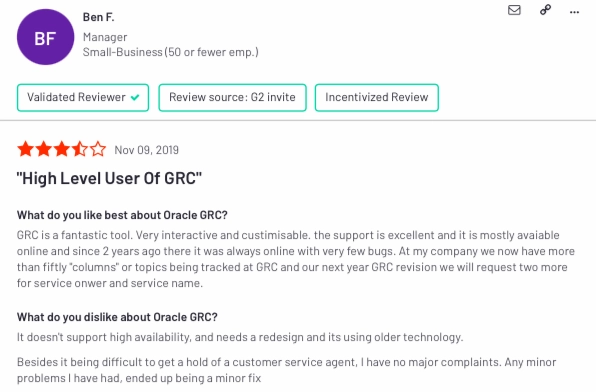
Pros:
- Highly customizable and interactive: Users find Oracle GRC to be a fantastic tool that is highly interactive and customizable. The platform allows for a personalized experience, catering to the unique needs and preferences of users and organizations. (See Figure 9).
Cons:
- Lack of High Availability Support: Users express dissatisfaction with the absence of high availability support in Oracle GRC. This limitation may impact system reliability and accessibility, particularly for organizations that prioritize continuous availability.(See Figure 9).
What are different GPU software types?
The landscape of Governance, Risk, and Compliance (GRC) software is diverse, catering to various aspects of organizational management. Here are different categories of GRC software:
1.) GRC from big tech
These GRC solutions are provided by major technology companies, such as IBM, Oracle and SAP. These GRC tools often integrated into broader enterprise software suites. These solutions may offer a wide range of functionalities, including risk management, compliance tracking, and governance tools.
2.) GRC suite providers
This category refers to tools with comprehensive enterprise GRC program that encompass a range of capabilities, including:
- Risk management
- Compliance monitoring
- Policy management
- Governance features.
GRC suite providers (e.g Archer and Logicgate) aim to offer an all-encompassing solution to manage various aspects of governance, risk, and compliance.
3.) Third- party risk management tools
These tools focuses specifically on managing risks associated with third-party relationships. This includes assessing and monitoring the compliance and security posture of external vendors and partners to ensure they meet the organization’s standards. Some examples involve Diligent, RiskKonnect and LogicManager.
4.) IT risk and security management
These tools concentrate on managing risks related to information technology and cybersecurity, such as Protect and Netwrix. This type of GRC software helps organizations identify, assess, and mitigate risks associated with their IT infrastructure and data security.
5.)Audit and compliance management
This category of GRC solutions specializes in facilitating compliance with industry regulations and standards. This may involve regulatory compliance, risk assessment, managing internal audits, and ensuring that the organization adheres to relevant compliance requirements.
6.) AI GRC
This field is a recently developing one which is why the number of vendors that applies artificial intelligence (AI) in the context of GRC is lower. Some of the activities that AI can automate can be listed as predictive analytics, compliance monitoring, and other GRC-related tasks to enhance efficiency and effectiveness. Some of these tools are Holistic AI and AISpire from MetricsStream.
7.) EHS management
Environment, health and safety management refers to mitigating risks and ensuring compliance with regulations related to environmental, health, and safety issues. GRC tools with EHS capabilities like SAI360 can monitor and manage such as workplace safety, environmental impact, and health regulations.
FAQ
What is GRC?
Governance, Risk, and Compliance (GRC) is a business framework that unifies organizational processes to ensure effective decision-making, risk mitigation, and regulatory adherence. It integrates policies and technologies to align operations with organization’s strategic objectives, fostering transparency and ethical conduct. Its components include:
Governance: Governance involves establishing and maintaining structures, processes, and policies to guide decision-making, ensure accountability, and promote ethical behavior within an organization, facilitating effective leadership and strategic alignment.
Risk management: Risk management is the systematic process of identifying, assessing, and mitigating potential threats and uncertainties that could impact the achievement of organizational objectives, enhancing resilience and informed decision-making.
Compliance: Compliance refers to the adherence to laws, regulations, and internal policies governing an organization’s operations. It involves implementing measures to ensure conformity, mitigate legal risks, and uphold ethical standards, fostering trust with stakeholders.
What are the benefits of GRC?
GRC tools yield significant organizational benefits across various facets of business operations, such as:
1. Streamlined operations: GRC unifies decision-making processes which promotes transparency and clarity and ensures consistency in governance structures.
2. Enhanced risk management: GRC tools systematically identifies potential risks, which ensures proactive risk mitigation and builds organizational resilience.
3. Regulatory compliance: GRC solutions facilitatesadherence to complex regulations, reducing the risk of legal and financial setbacks while ensuring ongoing compliance management.
4. Operational efficiency: GRC software improves overall operational efficiency by reducing redundancies and costly activities as it integrates governance, risk and compliance management under one roof.
5. Ethical conduct and trust building: GRC tools canfoster a culture of ethical conduct by building trust with stakeholders and demonstrating commitment to responsible business practices.
6. Long-term sustainability and adaptability: Itsupports strategic objectives and contributes to long-term sustainability while enhancing adaptability to changing business environments.
How to choose the best GRC software?
Selecting the best Governance, Risk, and Compliance (GRC) software involves careful consideration of your organization’s specific needs and requirements. Here are 5 key factors to guide your decision:
1. Identify Your Objectives: Clearly define your organization’s GRC objectives and goals. Understand the specific challenges and areas where GRC software can add value.
2. Filter tools by reviewing: Comprehensive Features: Look for a GRC solution with a comprehensive set of features that align with your organization’s requirements. This may include risk management, compliance tracking, policy management, and reporting capabilities.
a.) Scalability: Choose a scalable solution that can grow with your organization. Ensure the software can handle increased data volumes, users, and evolving GRC needs.
b.) Integration capabilities: Assess the software’s ability to integrate with existing systems such as ERP, CRM, or other critical business applications. Integration streamlines data flow and enhances overall efficiency.
c.) Customization options: Select a GRC solution that allows customization to meet your organization’s specific processes and workflows. This ensures that the software aligns closely with your unique requirements.
d.) Security Measures: Prioritize security features, including encryption, access controls, and audit trails. Ensure the software complies with industry standards and regulations to safeguard sensitive data.
e.) User-friendly interface: Opt for a user-friendly interface to enhance adoption across your organization. Intuitive design and easy navigation contribute to effective use.
f.) Relevant additional capabilities such as:
i.) Automation and Workflow Management: Look for automation features and robust workflow management capabilities. Automation reduces manual efforts, while efficient workflows streamline processes.
ii.) Reporting and Analytics: Evaluate the reporting and analytics capabilities of the GRC software. It should provide insights into risk assessments, compliance status, and other key metrics, facilitating informed decision-making.
3.) Check out real-life examples: Understanding GRC case studies is crucial for gaining practical insights, learning from best practices, and applying successful strategies in your own organization. Explore our GRC case studiesfrom 16 enterprises with 255 in-depth examples of successful GRC software deployments.
4.) Consider vendor reputation and support: Choose a reputable vendor with a track record of successful implementations. Consider the vendor’s support services, including training, ongoing support, and regular updates.
5.) Estimate costs: Evaluate the total cost of ownership, including initial setup costs, licensing fees, and ongoing maintenance. Ensure that the chosen solution provides value for its cost.
Further reading
Explore more on risk management, compliance and other GRC categories by reading:
If you believe your business can benefit from GRC software, start shortlisting in our comprehensive and data-driven vendor list.
If you believe you might need another tool for GRC activities, check out our GRC hub to see other relevant solutions.
External sources
- 1. Cau,D. “Governance, Risk and Compliance (GRC) software Business needs and market trends.” Deloitte. Accessed November 30, 2023.
- 2. SAP Access Control Reviews & Ratings 2025. TrustRadius
- 3. “ServiceNow user reviews.” Gartner. Accessed November 29, 2023
- 4. Archer Enterprise IT Software Reviews | Gartner Peer Insights.
- 5. Hyperproof Reviews 2025: Details, Pricing, & Features | G2.
- 6. NAVEX One Reviews 2025: Details, Pricing, & Features | G2.
- 7. IBM OpenPages Reviews 2025: Details, Pricing, & Features | G2.
- 8. Ideagen Internal Audit Reviews 2025: Details, Pricing, & Features | G2.
- 9. Oracle GRC Reviews 2025: Details, Pricing, & Features | G2.
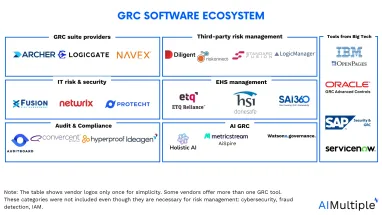


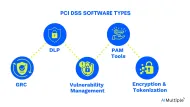
Comments
Your email address will not be published. All fields are required.